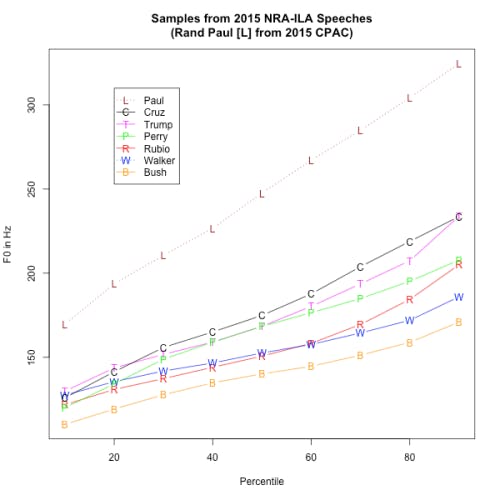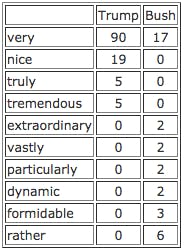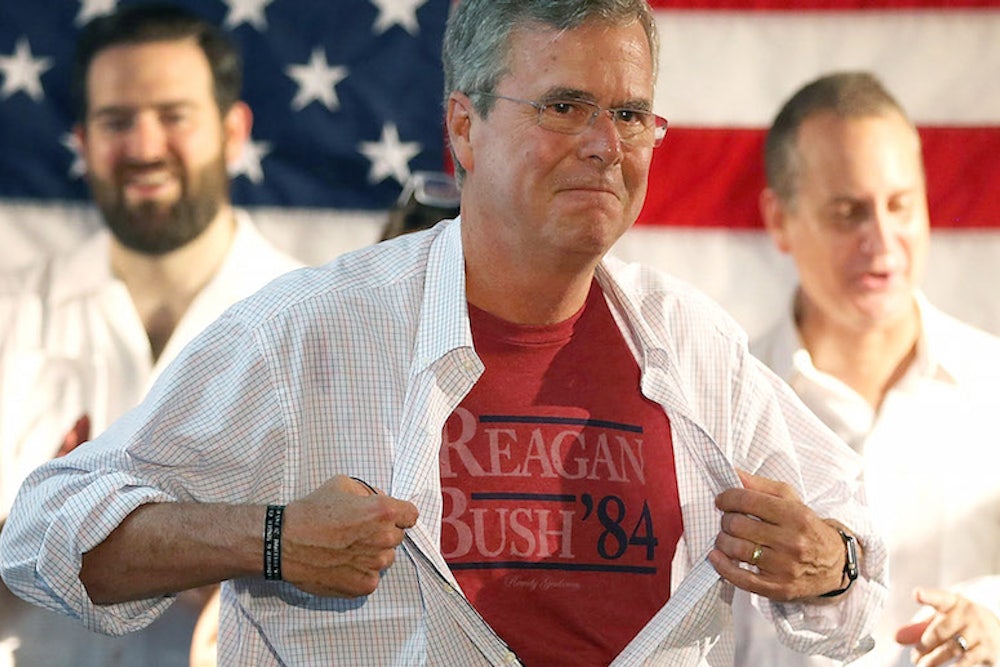Jeb Bush has been working on some really good comebacks to burn Donald Trump at the Republican primary debate on Wednesday, according to The New York Times. (The Times refers to these as “pointed responses.”) Trump has delighted in calling Bush “low energy,” and Bush has made the grave error of acknowledging it’s getting to him. An unnamed Republican told Politico’s Mike Allen that it stings because “It’s like he’s saying he’s low T.” But Bush’s low-energy problem goes deeper than the quality of his zingers. In fact, a linguist predicted Bush might face this kind of criticism before Donald Trump even got into the race. The way Jeb! talks makes him sound like he’s bored.

In Playbook this week, Allen promised the GOP debate will be a high T extravaganza. “CNN promos have been portraying the debate as a title fight between Trump and Jeb, and moderator Jake Tapper is as high-testosterone as you’re going to find,” Allen writes. “Jeb, who has sounded lately like he ate his Wheaties, wants to rub the Low-T cracks in Trump’s face.” But a deficit of manly testosterone isn’t really the problem for Bush. It’s actually that he doesn’t show enough of something we tend to associate with women: emotion. When we’re excited or speaking with a lot of emotion, the pitch of our voice varies more. (Think about how you would tell your coworker a spreadsheet is ready versus how you would describe winning the Super Bowl.) Bush doesn’t speak with a lot of emotion, which you see in University of Pennsylvania linguist Mark Liberman’s chart showing the pitch range of the candidates’ speeches at an NRA conference in March. Bush shows the least emotion, while Rand Paul shows the most. And that’s why Pitzer College linguistics professor Carmen Fought predicted Trump’s attack back in April: “Watch for someone to potentially say that Jeb Bush seems bored—maybe one of the other candidates or maybe someone criticizing him in the press.” Bush was likely holding back on the emotion in his voice to sound like the calm, rational Republican, but, Fought said, “he’s holding back on it so much that he may go too far and sound bored to people.”
A few months into the race, and Fought suggests that not only is Trump picking up on something real, but he’s presenting it in a clever way. She writes, “It’s a great insult too, because it’s so subtle and not even very mean or critical. And it’s not something you hear that often, but as soon as you hear it, you’re like, ‘oh yeah, that’s true, I never thought about it but I don't want a candidate that’s low energy! Who wants that?’”
Even worse for Bush, Fought says, is that there’s not a great way for him to counter the attack. Fought borrows from Mike Huckabee’s campaign book, which divides people into Bubbles (Coastal Americans who eat fancy things like arugula) and Bubbas (Middle Americans who eat earthy things like grits). In Fought’s linguistic analysis, the candidates have picked one or the other, and express this identity with the way they speak. Bubbas show more emotion with a wider pitch range, and have more of a regional accent. Bubbles show they are more rational with a smaller pitch rage, and regional differences in their speech have been educated away.
Jeb and George W. Bush sound quite different despite growing up in similar circumstances—“It’s not like one stayed home and ran the farm and one went to college,” Fought says. But Jeb sounds more Bubble and George more Bubba. Fought suggests that Jeb Bush is moderating his speaking style (consciously or not) to sound more competent and less emotional than his unpopular brother.
So now that Bush has decided to occupy the serious niche of the Republican field, he’s going to have a hard time showing he’s high energy without compromising his brand. “Jeb can’t yell and insult and rant at Donald. He can’t beat him at his own game, because he’s already set himself out as a ‘smart, rational’ candidate,” Fought explains. Even in the Times report previewing Bush’s counterattack, his own advisers confirmed as much. “For better or worse, advisers acknowledge, his brand is self-seriousness,” the Times reports. A quote from an aide is dramatically rendered: “‘His style,’ said Sally Bradshaw, a top Bush campaign adviser, ‘is substance.’”
Trump himself has provided some great material for linguists. Bush’s aides dismissively refer to Trump’s “theatrics,” but some of the features of his speech that make him sound unprofessional also give an impression of authenticity. For example, Liberman, who writes the fascinating Language Log website, points to a Slate request for readers to diagram a sentence from one of Trump’s speeches in July. The long block of text initially looks like nonsensical rambling. But in a post on Language Log, Liberman explains that when people are speaking off the cuff, the transcribed words often read as incoherent, because false starts and parenthetical clauses—communicated with body language and the rhythm of speech—disappear. So when Liberman looks at the same July speech that Slate mocked, he sees something “entirely comprehensible, and in the context of the speech as a whole, even eloquent,” he writes. “The false starts and parentheticals may actually make the speech better, at least for people who are open to liking Trump and endorsing his ideas, by giving an impression of enthusiasm and genuineness.”

And Liberman’s analysis of the words Bush and Trump employ gives more insight into the Bubble/Bubba dichotomy. Jeb uses more words. Liberman’s analysis of the words each candidate uses most often offers some insight into what issues are shaping the campaign: Trump talks about China, Mexico, and himself, while Bush talks about strategy, growth, and ISIS. Liberman created this nifty chart showing which words each candidate favors far more than the other. Bush says “rather” and “formidable” a lot, for instance, while Trump plays it a bit more monosyllabic.
So when Bush confronts Trump at the debate, what will he say? That Trump is rather rude? This is Jeb’s dilemma. “The whole point is that Bubbas feel genuine emotions and when something is going wrong with the country they get mad and yell about it and then take you out for a beer,” Fought says. “University types can’t do that. And Jeb has put himself on that side. But if he takes a calm rational approach to the criticisms, he just confirms what Trump is saying! Poor Jeb.”
